Top Rankings
Sweet Springs R-VII School District ranks among the top 20% of public school district in Missouri for:
Category
Attribute
Reading/Language Arts Proficiency
Highest reading/language arts proficiency (Top 20%)
For the 2025 school year, there is 1 public elementary school serving 204 students in Sweet Springs R-VII School District. This district's average elementary testing ranking is 10/10, which is in the top 10% of public elementary schools in Missouri.
Public Elementary School in Sweet Springs R-VII School District have an average math proficiency score of 52% (versus the Missouri public elementary school average of 40%), and reading proficiency score of 57% (versus the 42% statewide average).
Minority enrollment is 3% of the student body (majority Hispanic), which is less than the Missouri public elementary school average of 32% (majority Black).
Overview
This School District
This State (MO)
# Schools
2 Schools
1,747 Schools
# Students
383 Students
575,116 Students
# Teachers
39 Teachers
46,819 Teachers
Student : Teacher Ratio
10:1
10:1
District Rank
Sweet Springs R-VII School District, which is ranked within the top 30% of all 553 school districts in Missouri (based off of combined math and reading proficiency testing data) for the 2021-2022 school year.
The school district's graduation rate of 90% has increased from 80% over five school years.
Overall District Rank
#114 out of 557 school districts
(Top 30%)
(Top 30%)

Math Test Scores (% Proficient)
40-44%
39%
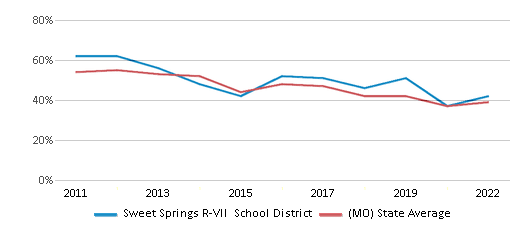
Reading/Language Arts Test Scores (% Proficient)
53%
43%
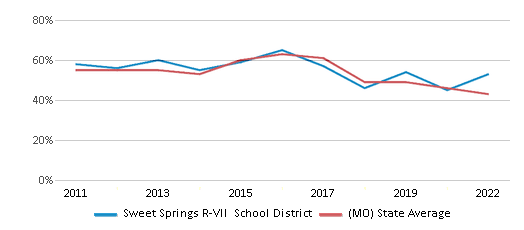
Science Test Scores (% Proficient)
30-34%
38%
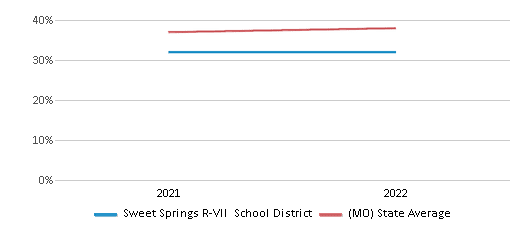
Graduation Rate
≥90%
90%
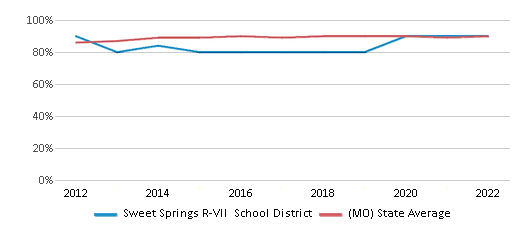
Students by Ethnicity:
Diversity Score
0.08
0.51
# American Indian Students
n/a
2,038 Students
% American Indian Students
n/a
n/a
# Asian Students
n/a
12,320 Students
% Asian Students
n/a
2%
# Hispanic Students
8 Students
47,223 Students
% Hispanic Students
2%
8%
# Black Students
5 Students
89,252 Students
% Black Students
1%
16%
# White Students
368 Students
389,099 Students
% White Students
96%
68%
# Hawaiian Students
n/a
2,412 Students
% Hawaiian Students
n/a
n/a
# Two or more races Students
2 Students
32,772 Students
% of Two or more races Students
1%
6%
Students by Grade:
# Students in PK Grade:
26
19,285
# Students in K Grade:
29
59,679
# Students in 1st Grade:
18
62,780
# Students in 2nd Grade:
20
65,110
# Students in 3rd Grade:
31
63,746
# Students in 4th Grade:
32
64,813
# Students in 5th Grade:
24
64,811
# Students in 6th Grade:
24
65,222
# Students in 7th Grade:
29
48,663
# Students in 8th Grade:
36
48,580
# Students in 9th Grade:
37
3,086
# Students in 10th Grade:
27
3,116
# Students in 11th Grade:
23
3,104
# Students in 12th Grade:
27
3,121
# Ungraded Students:
-
-
District Revenue and Spending
The revenue/student of $13,042 in this school district is less than the state median of $15,081. The school district revenue/student has grown by 8% over four school years.
The school district's spending/student of $14,107 is higher than the state median of $13,908. The school district spending/student has grown by 8% over four school years.
Total Revenue
$5 MM
$13,447 MM
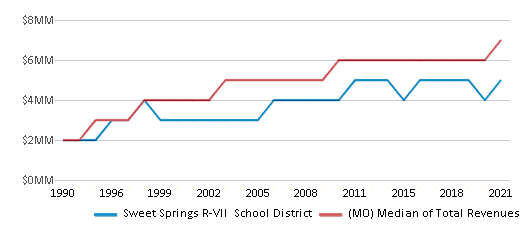
Spending
$5 MM
$12,401 MM
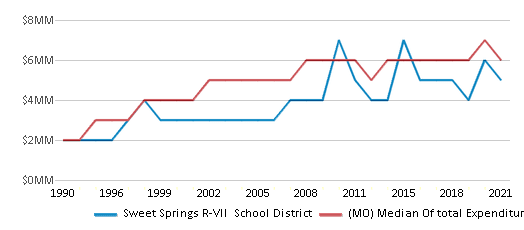
Revenue / Student
$13,042
$15,081
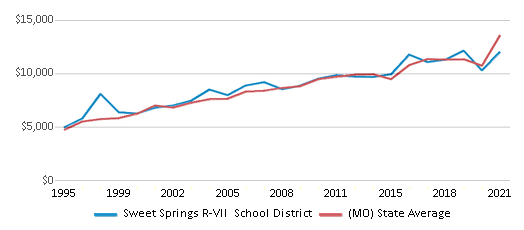
Spending / Student
$14,107
$13,908
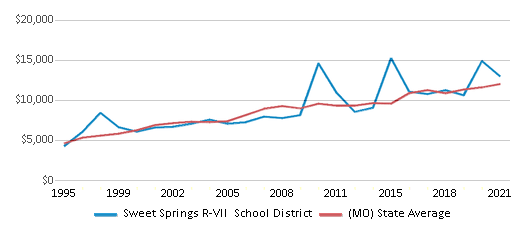
Best Sweet Springs R-VII School District Public Elementary Schools (2025)
School
(Math and Reading Proficiency)
(Math and Reading Proficiency)
Location
Grades
Students
Rank: #11.
Sweet Springs Elementary School
(Math: 50-54% | Reading: 55-59%)
Rank:
Rank:
9/
Top 20%10
600 E. Marshall
Sweet Springs, MO 65351
(660) 335-6348
Sweet Springs, MO 65351
(660) 335-6348
Grades: PK-6
| 204 students
Recent Articles

What Is A Charter School?
Explore the world of charter schools in this comprehensive guide. Learn about their history, how they operate, and the pros and cons of this educational innovation. Discover key facts about charter schools, including admission policies, demographics, and funding, as well as what to look for when considering a charter school for your child.

10 Reasons Why High School Sports Benefit Students
Discover the 10 compelling reasons why high school sports are beneficial for students. This comprehensive article explores how athletics enhance academic performance, foster personal growth, and develop crucial life skills. From improved fitness and time management to leadership development and community representation, learn why participating in high school sports can be a game-changer for students' overall success and well-being.

February 05, 2025
Understanding the U.S. Department of Education: Structure, Impact, and EvolutionWe explore how the Department of Education shapes American education, from its cabinet-level leadership to its impact on millions of students, written for general audiences seeking clarity on this vital institution.





